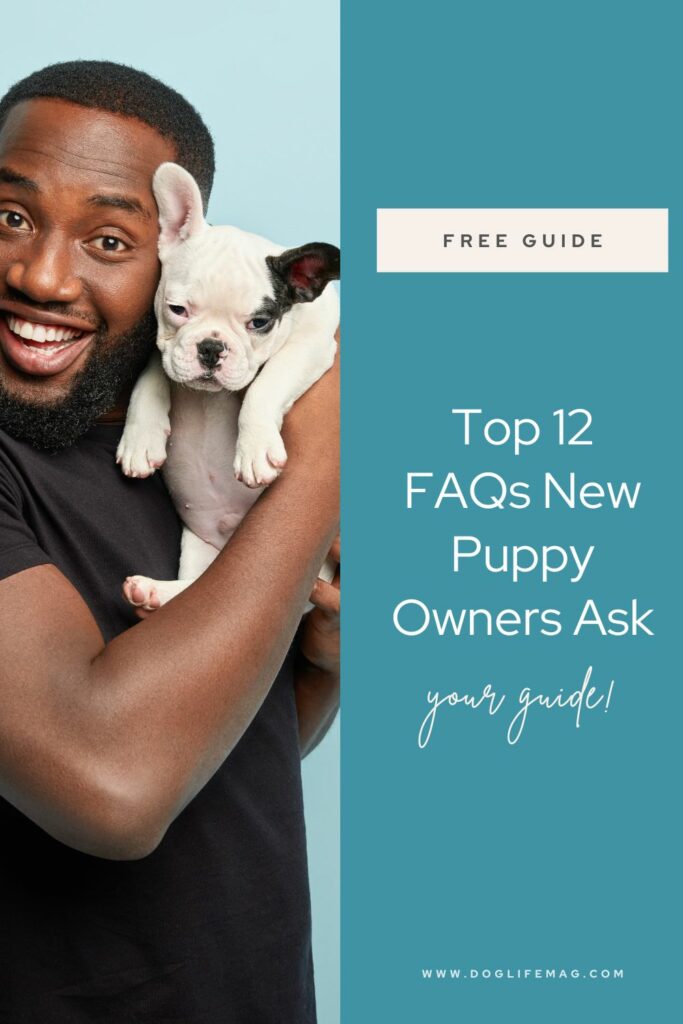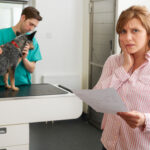If you’ve just brought a new puppy home, you are probably finding yourself asking when and what puppies can do and need in the first several months. Well, we’ve got you covered answering the top 12 new puppy owner FAQs with our guide to where, what, and when puppies can do specific activities, behaviors, training and when and what they might need at certain times throughout their puppyhood such as:
- When is a puppy ready to leave their mom?
- Is my puppy ready to be left alone?
- Should my puppy sleep inside the crate?
- When can I take my puppy out in public?
- Should I be grooming my puppy?
- Is my puppy ready to go up and down stairs?
- What can my puppy eat?
- How do I start training my puppy?
- When can I start potty training my puppy?
- When should I take my puppy to the vet?
- Does my puppy need flea or heartworm medications?
- When should I get my puppy microchipped?
Puppies are adorable little bundles of joy. They bring laughter and joy into our lives. But don’t be fooled. Puppies are also a lot of work. They are new to this world. Those lucky enough to call them ours must nurture and protect them.
Being a new puppy parent is full of snuggles and play times but also of biting, crying, peeing, and more peeing.
The first few weeks and months you two are together are an important time in your fur baby’s life. From choosing a dog name to house training and socializing to vaccinations and crate training, you are likely plagued with questions as a new puppy parent.
The Top 12 FAQs All New Puppy Owners Ask
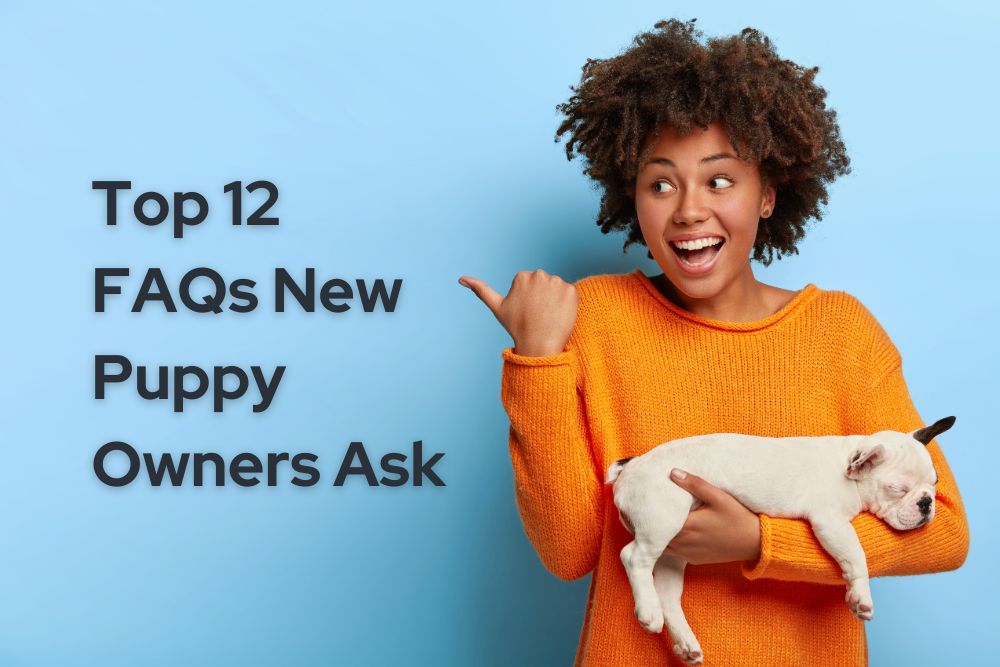
1 – When is a puppy ready to leave their mom?
Experienced dog trainers and dog development experts recommend waiting until a puppy is at least 8 to 9 weeks of age before you introduce them to their new home. By this point, they should be eating on their own.
If your puppy is kept from suckling for food and comfort, they might show signs of insecure behavior when they are older. However, leaving them with their siblings a little longer can benefit them socially.
2 – Is my puppy ready to be left alone?
For the first 10 weeks of your fur baby’s life, they cannot be left alone. Once they are 3 months old, you can start leaving them alone for gradually increasing lengths of time.
You can use their age as a guide. You can leave them alone for 1 hour every month they’ve been alive. For example, if they are 4 months old, you can leave them alone for 4 hours.
3 – Should my puppy sleep inside the crate?
At first, your puppy’s crate is their safe space and bed. They should be regularly sleeping in their crate. Now, if they fall asleep on the floor or on your lap, don’t worry about moving them. Puppies take a lot of naps. If you can move them to the crate, go ahead, but it’s unnecessary.
Eventually, you can let them sleep outside the crate if you like. When you should transition them out of the crate, really depends on your puppy.
You want to make sure they are potty-trained enough that they won’t have accidents in the middle of the night and are mature enough to not chew up your home while you sleep.
Some experts say you can start letting them sleep outside their crate when they reach 4 to 6 months old, while others say you might need to wait until they are 17-18 months old. It depends on you and your dog.
There are a few factors that will influence how soon you let your puppy sleep outside of their crate at night:
- Age and Development: Puppies go through various developmental stages, and their ability to control their bladder and sleep through the night improves as they grow.
- Housebreaking Progress: If your puppy has consistently demonstrated good housebreaking habits, such as reliably relieving themselves outdoors and minimizing accidents indoors, it’s a positive sign that they may be ready to sleep outside the crate.
- Behavioral Maturity: Observe your puppy’s behavior during the day and evening. If they can settle down calmly, refrain from excessive chewing or destructive behavior, and are generally well-behaved, it suggests they are becoming more responsible and may handle sleeping outside the crate.
- Trustworthy Behavior: Before giving your puppy free access to your home, they should display trustworthy behavior. This means they don’t engage in destructive chewing, don’t have accidents inside, and respect boundaries. If they consistently exhibit these behaviors, it indicates they may be ready for more freedom at night.
- Gradual Transition: Rather than an abrupt change, consider a gradual transition from crate to no crate. Start by allowing your puppy to sleep in a confined area near your bedroom, such as a small puppy-proofed room or an exercise pen. Over time, as they demonstrate reliability and good behavior, you can expand their sleeping area.
- Home Environment and Surroundings: Investigate and rate your home’s safety level. Remove any potential hazards, secure electrical cords, and use gates or barriers to limit access to certain areas.
Important note: when we say ‘sleep outside the crate’ we do not mean sleep outdoors! It is not safe for puppies, and in most situations adult dogs, to sleep outdoors at night.
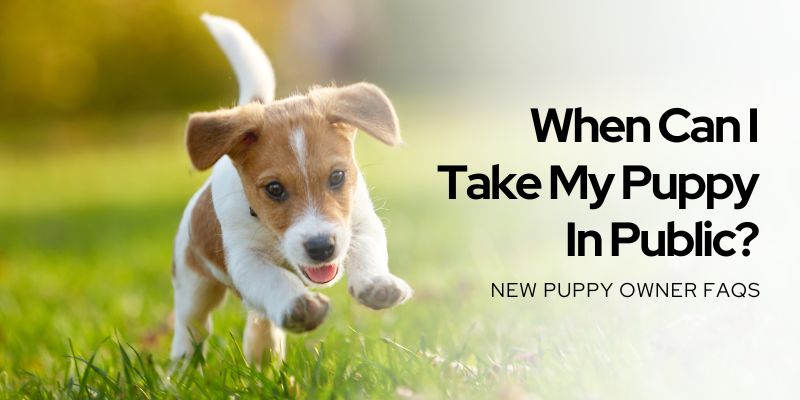
4 – When can I take my puppy out in public?
Before you take your puppy out in public and allow them to interact with other dogs, they must have all their vaccinations, especially parvo shots. Parvo is easy for them to catch and devastatingly lethal. A member of our team can sadly speak from experience…
Once they have their shots, you can take them on walks or to the dog park. Although, depending on your puppy’s size and temperament, you might want to be cautious at the dog park. Many dog parks will have separate areas for small dogs. Those are perfect for pups!
5 – Should I be grooming my puppy?
You can start brushing at any point, bathe them and trim their nails as early as 2 months old. However, you should wait around 2 weeks after you bring your fur baby home before you bathe them for the first time.
They need the familiar scent to help them transition into their new home. At that age, baths can be a little traumatic, and they need to bond with you a little more to help ease their anxiety.
DO NOT USE FLEA AND TICK SHAMPOO ON PUPPIES. Consult with your veterinarian to determine the age at which you can use flea and tick shampoo or administer flea and tick medicine to your puppy! Various factors will affect when you can use these products on a puppy such as the specific product, your puppy’s age, weight and overall health.
As far as their first haircut is concerned, there are mixed feelings about when it is appropriate for them to get their first trim. For most breeds, it is essential to wait until they have developed their “adult” coat which is longer and coarser than their puppy coat.
If your dog is a breed that goes through this change, trimming its hair too soon can impact the quality of its coat and lead to problems in adulthood. This change usually occurs around the 6–8-month mark, so if you are concerned, we recommend speaking with your vet and waiting until you’ve seen their fur change.
Read our dog grooming guide for grooming tips and tools for cleaning up your pup!
6 – Is my puppy ready to go up and down stairs?
Most puppies can start climbing stairs at around 3 months old, but you’ll want to supervise them for the first few weeks. They aren’t exactly coordinated, and if you have long staircases, you’ll want to make sure they don’t have a tumble.
Some puppies will be adventurous and recklessly attempt the stairs where other puppies will be too terrified to attempt a staircase for a while. The age at which it will be safe for your puppy to go up and down stairs will depend on factors such as developmental progress, their size, and their breed.
Some small breed puppies are too small to attempt jumping off a couch! If you have any concerns, speak with your vet about the abilities of your pup to be sure your puppy is safe and avoids injury.
7 – What can my puppy eat?
Adult food won’t contain the vital nutrients your puppy needs to grow big and strong. Puppy food is specially formulated to provide the nutrients your fur baby needs. You can feed them dry puppy food by the time they are 9-10 weeks old if they are a large breed or 12-13 weeks if they are a small breed.
Until they are about 3 months old, it is suggested to feed them small portions 4 times a day. When they are 3-6 months old, you can decrease the frequency to 3 times a day. After 6 months, you can start feeding them twice a day.
They don’t burn as much energy, and their adult teeth should also be in. By the time they are a year old, you can switch to adult food because their bodies will be nearly full-grown, and their energy levels will be lower. Check out our What Can Dogs Eat list of foods that are safe and unsafe for your doggo.
You can start using small, soft dog treats to train your fur baby by around 6 weeks of age.
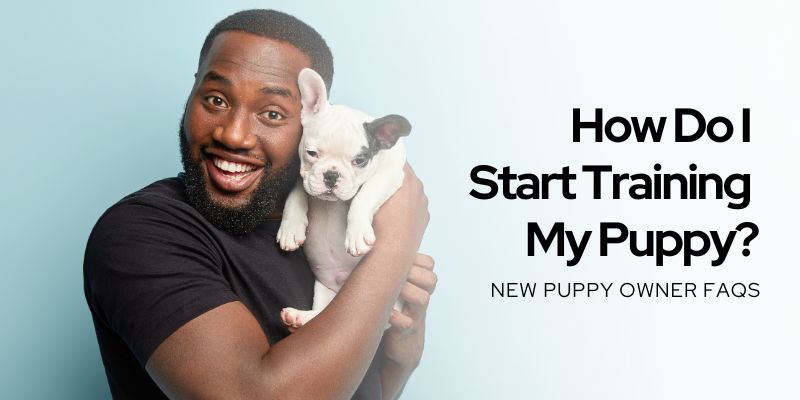
8 – How do I start training my puppy?
Crate Training:
Experts recommend that you start crate training as soon as you bring your puppy home. Starting early helps your puppy ease into regular crating as an adult.
The crate will become a safe space in their new home. Because everything is new to them, this really is the optimal time to introduce them to their personal space. Some puppies accept their crates quickly, while others need time.
Behavior Training:
You can start training your puppy when they are 2 months old. However, you’ll want to start small. Use simple and consistent basic obedience commands followed by rewards.
You can try teaching them to sit or come and put a leash on them to help them get comfortable on a leash.
Your training sessions shouldn’t be longer than about 10 minutes at first. You can take them to a trainer or wait until they are a little older. As they get older, you’ll notice their attention span will last longer, and you can increase the duration of their training.
9 – When can I start potty training my puppy?
You can start trying to potty train your puppy as soon as you bring them home. Introduce them to pee pads and/or take them outside frequently to show them where to do their business. But they won’t start having control over their bladder until around the 12-week mark.
Until then, you can expect a lot of puddles and accidents. The younger your pup is, the more often they will need to relieve themselves. Much like human babies, the older they get, the less frequently they pee.
10 – When should I take my puppy to the vet?
At around 6 to 8 weeks, you should take your puppy to the vet for their first health exam and their first round of vaccinations.
Your puppy’s primary vaccines are rabies, canine distemper adenovirus (hepatitis), and parvovirus. The vaccination schedule is very important, so make sure you follow your veterinarians recommendations.
11 – Does my puppy need flea or heartworm medications?
Typically, you can start using flea and tick shampoo on a puppy approximately at 12 weeks of age. It is not safe to use it any time before this. However, it’s not likely that your newborn puppy will need flea and tick medication because they aren’t old enough to go outside yet.
WARNING: SPEAK WITH YOUR VET FIRST! Your puppy’s age, weight, breed, overall health, and the flea and tick product type will determine if it is safe to use flea and tick shampoo or medication. Flea and tick collars are not suggested, can cause injury, and can be fatal.
When you finally confirm with your vet that it is time to start your pup on flea and tick medication, you’ll have options to choose from such as oral vs. topical flea and tick remedies and even natural flea and tick treatments. Speak with your vet to discuss factors that may sway your decision like how it’s administered, which option is better or safer for their particular pet’s health and circumstances.
Usually, you can also start your puppy on heartworm medication after 8 weeks. At this point, it is considered safe for them, although, like with flea and tick medicine, there are various factors that will determine the product type, dosage, and age at which it is safe to administer to your puppy.
Most likely, you aren’t going to need it until your puppy starts spending time outside. If your puppy is 6 months or older and has not yet started heartworm prevention you will need to speak with your vet to run a heartworm test before giving them heartworm prevention medication.
Our key message: speak with your vet FIRST to determine your puppy’s flea and tick and heartworm prevention medication products, dosage and schedule.
12 – When should I get my puppy microchipped?
Your puppy will be ready to be microchipped when they reach 8 weeks old. The sooner you do it, the sooner your furry friend will be protected should they get lost or worse, stolen.
If you are concerned, talk to your vet about microchipping options. Check your local law regarding pet registration, vaccinations, and microchipping too.
In our experience.
It might seem like a lot to juggle during the first few months with your adorable puppy. But don’t let that overwhelm you; puppies do get easier and they are worth all the stress and exhaustion!
To keep you both on track with training, check out our week-by-week puppy training schedule too.
The most important thing is to build a consistent routine, bond, and love them to the best of your ability. Enjoy the puppy phase while you can!
